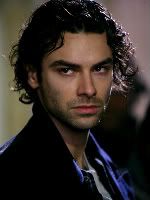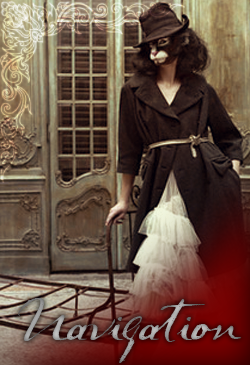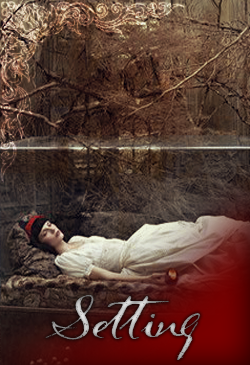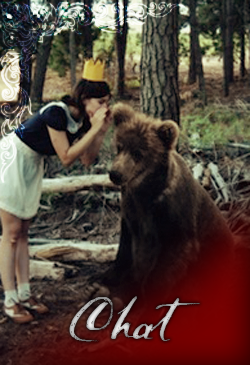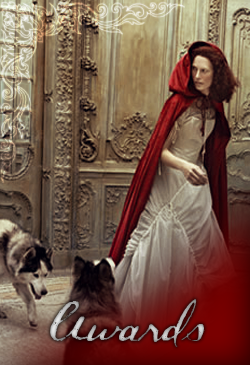Post by JOEL VULPINI on Mar 2, 2012 23:13:51 GMT -5
...joel alphonse vulpini *
* “You eat meat with your teeth and you kill things that are better than you are, and in the same respect you say how bad and even killers that your children are. You make your children what they are.” – Charles Manson *
[/size]* “You eat meat with your teeth and you kill things that are better than you are, and in the same respect you say how bad and even killers that your children are. You make your children what they are.” – Charles Manson *
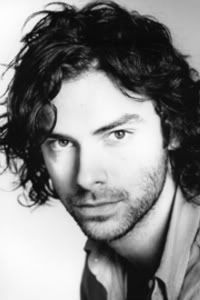

...basics*
name Joel Alphonse Vulpini
nickname Joel is pretty simple in and of itself. His brother called him “Rat.”
age 25
gender Male
grade N/A
hometown Chicago, Illinois
sexuality Straight? Uh. Sure.
personification The Fox from “The Gingerbread Man.”
status AWAKE
face claim Aidan Turner
...appearance*
hair color Dark brown, very curly. He usually keeps it fairly long compared to how long most men would want their hair, and sometimes he slicks it back, if only to keep the curls out of his eyes.
eye color Dark brown, usually wide and just a little nervous.
build Leanly muscular. He actually exercises to keep the figure, too. It might also help that he never eats.
height 5’9 inches. A bit on the short side for a man, perhaps.
clothing style The best way to describe it would be homeless gentleman.
distinctive traits He has great eyebrows.
...personal*
personality
Joel is honestly an incredibly sweet young man. To those close to him, he is considerate, caring, and gentle. His voice is soft, and his demeanor unassuming. His manners are impeccable. He will hold the door for you and he has a very small but very endearing smile, and his behavior is constantly humble and modest. He has a difficult time taking praise, and he is always eager to do things for the people he cares about. Joel is incredibly protective of his younger sister, Hannah – he would do anything to keep her safe, even at the cost of his own life. Although he does not pay this much devotion to all those he is close to, he does tend to form tight bonds with those he does trust.
Mostly because he only trusts two people in the world.
Joel is paranoid. He isn’t just the average paranoid, the stranger-danger paranoid, the monster-in-the-closet paranoid. Joel is bugs-in-the-walls paranoid and government-tapping-the-phone-lines paranoid. He lives his entire life in an eternal state of fear and mistrust of everyone and everything around him, including every stranger he passes in the street. And he remembers all their faces, every single one that has given him a sideways glance. And he remembers every terrified thought he as ever thought about them, every stab of terror. His sense of self-preservation has become so powerful and his delusion so strong that now, years after he moved away from home, he still finds himself terrorized by men who could be spies for his father, by agents planning to put chips in his neck while he sleeps.
They all have malevolent intentions, and Joel does what he does because he honestly believes that he will be in mortal peril if he does not. Someone looks at him the wrong way, and his delusion develops them into a coldhearted murderer who is coming to get him in his sleep. As the reincarnate of an animal, his will to survive is exceptionally strong, and his extreme paranoia brings out the primal kill-or-be-killed urges that force him to act. Joel kills because he thinks he has to, and though he regrets having to kill, he regards it as a necessary evil. He always feels much safer and calmer after a murder.
Joel is suspicious and wary of every human being on the face of the earth except for his mother and Hannah, and, on some occasions, those whom Hannah deems trustworthy. Hannah is his “safe person,” so whatever she says and whatever she does is fine with Joel – he trusts her unconditionally in a world in which he feels he can trust no one. He worships the ground Hannah walks on. He will use whatever she gives him, wear whatever she buys him, and love whatever she says to him. However, his adoration for her does not come off as eerie in any way, as it is perfectly innocent: he is just an uncommonly devoted brother.
Joel’s mother taught him to be deeply religious, and it became somewhat of a sanctuary for him as he grew progressively more and more unreasonable in his thought patterns. He believes in God wholly and desperately, as it is one of the few sources of comfort he can find in his life. The idea that there is someone watching over him and guiding him on his path is reassuring for Joel, because he often has no idea what his direction is in life or if what he is doing is right. He is convinced that he is going to Hell, but he is doing his best to please God in every way possible before he dies. Despite feeling that his murders are justified, he still knows that they are murder, and therefore not only against society’s laws, but God’s laws. Joel prays every day and attends church as often as possible, though he never reveals his greatest sins in confessional – those he saves for his private conversations with God. After all, the priests can’t be trusted to keep his secret. Nobody can. Not even Hannah. He would never think to involve her in something so feral.
Though he used to seek approval wherever he could find it, Joel has grown away from the rest of society as his mental illness has developed. While he used to be the type of child who would do anything for even a word of praise, now he hardly ever leaves his room – wherever that might be – and intentionally isolates himself. Joel has been isolated his entire life, and though it has made him incredibly lonely, he has accepted it as fact. He is under the impression that he does not deserve any real company. He is not worthy of it.
Joel’s self-deprecation is extreme. He hates himself because he was taught to. As a child, he was told almost constantly by his older brother that he was unwanted, and though his father never outright said it, Joel knows his father has blamed him for preventing his mother from conceiving any more children after his birth. Joel has serious, deep-rooted issues with his father and a searing hatred for his brother, who made most of his childhood hell on earth. His brother also took pains to remind Joel that he was the mistake, the unnecessary child.
After years of hearing this, Joel started to believe it. He became convinced of his worthlessness and unimportance in the world. He tortures himself daily with self-loathing and nasty comments, and he is perpetually unhappy and severely depressed for this reason. He does not see any meaning to life other than staying alive and protecting his sister. His life is not lived for himself, but rather for the animalistic sake of living, and for Hannah.
Joel also has a darkly creative imagination, one that unfortunately plays a large part in his delusion. He accesses this creativity through artwork, the only way he knows to express himself. Most of the drawings are exceptionally morbid, and he usually disposes of the sketchbooks he fills when they are done, but they help him to vent some of the horrible feelings stored up inside him.
He also isn’t very good to his body, and his body isn’t very good to him. Due to a fear of food-borne illness and also just a general lack of appetite, Joel is a picky and infrequent eater, which leaves him malnourished – one of the reasons he continues to fall ill even as an adult. Though he exercises, he is significantly underweight for his height; he just hides it well. He has also harmed himself in the past, either out of self-hatred or out of the honest belief that someone has put something under his skin, and thus, he has an unusual number of odd, lumpy scars, mostly on his arms. Joel also suffers from horrible night terrors and thus rarely sleeps, which usually leaves him with deep bags under his eyes.
past
Joel Vulpini was the unwanted child.
His father, Franklin Vulpini, heir to a small squandered fortune he was scrambling to rebuild, married his mother for the sake of convenience, for bearing children. Franklin didn’t want a pretty wife – he wanted an obedient one, and Olivia Mason, unfortunately, became that wife. After the unloving marriage produced a male heir, Franklin Jr., the heartless Franklin Sr. demanded of his wife a daughter.
She did not produce one.
Instead, much to Franklin’s chagrin, Olivia produced another boy. He was named Joel Alphonse Vulpini, and from the moment his sex was determined, his father disliked him. The moment Franklin Sr. found out that Olivia could have no more children, he abhorred him. It automatically became Joel’s fault as much as Olivia’s that his mother had become incapable of children – he was a plague on the Vulpini house, a miserable, sickly runt who had ruined all of his good father’s plans. It was his fault that Olivia Vulpini would never have a daughter. It was his fault that he existed, and that he was not a girl.
Franklin could not stand to look at his son. He despised him, loathed him, hated him, and his cold behavior towards Joel, his eagerness to place the blame on him even when it wasn’t the boy’s fault, rubbed off on Franklin Jr. Only, the younger of the Franklins was twice as vicious.
Franklin Jr. was only a year older than Joel, but he took pains to terrorize his younger brother as much as possible. Everything that his father didn’t say in his icy looks, Junior happily said aloud. He bullied his brother relentlessly, and devised the clever nickname “Rat,” a name he made up to hurt Joel’s feelings just shortly after the boy turned three. “Everybody hates rats,” he would say, pulling his brother’s hair. “Everybody hates you. Nobody wants you. Why were you born? Daddy wanted a girl.”
And Joel would cry, and his father would ignore him. Eventually, he learned that crying and whining about his brother’s behavior would get him nowhere – the only man who had any control over Junior’s actions would do nothing to help little Joel.
Daddy wanted a girl. Daddy wanted a girl. Why were you born? Nobody wants you.
Olivia, Joel’s mother, was his only place of solace. Olivia loved her younger son desperately, and often felt that they were “together” in their misery under the iron fist of Franklin Sr. She did not have much power or spending money of her own, but she spoiled and coddled Joel to the best of her ability, buying him chocolates and candies and holding him while he cried. Olivia, a staunch Catholic, instilled the love of God in her son’s heart – something onto which they could both hold. They were a refuge for each other, and Joel loved no one in the world as strongly as he loved his mother.
But neither of their trials were over. When Joel was still very young, his Uncle Marlin and Aunt Felicia came to live with him, upon his father’s request. Joel knew nothing of the dark intentions his father had for his Aunt Felicia, nor did he understand what was happening when his uncle became very sick. He did not understand when his Auntie began to look sadder and weaker, and he did not understand when his mother yelled at his father or why she cried so much afterward. It escaped his three-year-old understanding that his aunt had become pregnant with a baby that wasn’t his Uncle Marlin’s, but, in fact, his father’s. When he asked his father about it one day, Franklin Sr. said, quickly and dismissively, “You’re going to have a sister.” His tone was laced with contempt. As if Joel didn’t deserve a sister.
Joel didn’t find out that Felicia was actually the mother of the new baby girl, as Olivia kept Felicia in seclusion and faked the pregnancy herself. It was supposedly a miracle that Olivia had been able to carry a baby to term. Joel, who up until then had been his mother’s favorite child, was jealous for a while in a four-year-old kind of way, but soon got over it and learned to adore his baby sister. For all of Olivia’s resentment, never once did she discourage Joel from loving his younger sibling – had she done so, he would have rejected little Hannah Claire almost immediately. His mother’s word was sacred.
But Olivia loved Hannah as much as she loved Joel, and sought to protect the little girl from her father, who spoiled her endlessly. Joel immediately pitched in to help. As Hannah grew older, Joel frequently took the blame for numerous mishaps she got into, largely without Hannah’s knowledge. When they were all at school at the same time, Joel was with his sister as often as possible to make sure she was alright. This was easy for him, because he didn’t have any friends. Junior’s cruelty towards him rubbed off on all of his compatriots, and by the age of eight, Joel was so disliked by most of the elementary school that trying to make friends was a lost cause. No one would talk to him.
But he’d grown used to isolation.
Still, he hadn’t grown used to being bullied by so many people at the same time.
Joel was a sickly child. He had asthma, and was frequently falling ill with colds and flus, a trait that – of course – made him even more useless in the eyes of his father. The other children frequently picked on him for it, stealing his inhaler or knocking him over when he had to sneeze. Once, during gym class, he had an asthma attack, only to find his inhaler had once again been stolen; he nearly had to go to the hospital.
He was fragile, both mentally and physically – he was a spindly boy of a dark complexion and wild, curly hair, who acquired a sallowness in his cheeks and a perpetual terror in his eyes after years of torture at home and at school. It became necessary to be constantly on the alert, especially at school but also at home – Junior could get away with almost as much there as he could on the school playground. As Joel grew, he acquired a constant feeling of fear, be it in provoking his father to strike him (something he was always afriad of, though it never happened) or somehow incurring the wrath of his brother. However, out of fear that his mother or Hannah would find him whiny and childish for complaining about such harassment, he hid his terror – and his scars – well.
Joel always acted as a mediator between Frankie and Hannah. He thought of it as his obligation as the middle child, the unwanted child, to make himself somehow useful. Frankie was the heir and Hannah was the favorite, but Joel meant nothing. He would get nothing, he was nothing, he felt like nothing. And so he mediated between the two somethings in the house, like a good brother ought to do.
By the age of seventeen, Joel was suspicious of everyone.
He didn’t go out. He didn’t ever go out. He stayed at home and he kept the door to his room locked, and he read books. That was what he did. There was no conventional teenagehood for Joel, full of car rides and friends and parties. Junior got a car, but he didn’t. He didn’t even have birthday parties; even if he’d mustered up the guts to ask his father, he would have had no one to invite. After the horror of elementary school and the even greater trials of middle school, he was inherently distrustful of all students, so much so that he ate lunch in the bathroom every day, as opposed to sitting in the cafeteria with all the kids who most certainly hated him and were saying mean things about him behind his back. He was absolutely sure that every student in the high school wanted to see him hurt, so that they could laugh.
Joel got remarkably good grades, both because he was relatively smart and because he had little else to do with his time besides schoolwork. He was very diligent, eager to impress his teachers even in high school – he sought praise wherever he could find it, if only as reassurance that he wasn’t a complete waste of time and space. His teachers found him a sickly and jumpy but incredibly sweet boy, always running errands for them and always incredibly polite. He proved to be a rather talented artist, although his Art teachers always seemed concerned that the subjects of his paintings were always gruesome or macabre. He was referred to the counselors several times, but each time, he smiled his way through the interview and convinced them that nothing was wrong.
After all, they would just tell Father, and then he’d get a beating.
When it was time for Joel to go to college, he had the grades to go most anywhere he wanted. But he was now consumed by his paranoia. He attended a local college in Chicago – albeit a good one – and did not even get a dorm there, instead staying at home and commuting to and from the campus. Again, his lack of any sort of social life proved to be an excellent motivator for schoolwork.
Joel’s paranoia was manageable up until the age of 21, when his little sister, now 16, started insisting that she wanted to go to New York to take pictures. His father outright refused, and the two fought over the issue for some time. Joel thought that the issue was settled – which was good, because the idea of losing his little sister was terrible – but it was not.
Hannah found out the truth about her parentage: she was Aunt Felicia’s daughter, not Olivia’s, and she had been lied to all this time. His sweet little sister threatened to kick up a fuss in the local tabloids and spoil the Vulpini family name if she was not given money to go away to New York, and thus, Franklin Sr., so concerned about his reputation, allowed her to go.
That day, Joel lost not only his sister, but also a vital support of his sanity. He had centered his entire world around the two good things in his life: his mother and his sister. With one of those things gone, he was sent reeling. He snapped.
present
Suddenly, everyone in the world was the enemy. Televisions, phones, shop clerks, passersby, engineers, grad students, everything, everyone, anyone, they were all risks to him. Hannah had been safe to him, and with her gone and his mother reeling from her abrupt departure, Joel’s pillars of security were pulled out from under him. His paranoia was so strong that he became completely convinced that his father was bent on killing him, and felt that he had to flee Chicago for his own safety. And so, just three months after Hannah left for New York City, Joel moved out.
From then on, he traveled, picking up odd jobs as he moved about the country but unable to keep any of them, as he sooner or later became convinced that the security cameras or monitors or other employees were spying on him. This was also around the time that he started picking out people who would give him odd looks or stare at him, people that he became convinced in that very second wanted him dead, wanted to report him and get him sent home or locked up and no, no, he couldn’t let that happen. He didn’t want to go home. His father was going to kill him.
So he began to act in what he believed was self defense.
He killed them before they could hurt him.
Each time he killed, he took no joy in it, no sexual pleasure, only relief, relief that he had once again saved himself from harm. Each time he killed, he made himself watch even if he wanted to black out. Each time he killed, he hated himself, but he couldn’t stop. If he did, they would surely kill him first.
It was after his first murder, on the night of the new moon, that the fox in him awoke. He shifted for the first time, an indescribably painful experience that he suffered alone, utterly confused by the black fox form he had now acquired. Since then, he has developed a liking for his fox body; he can travel around relatively undetected and fit into small spaces to hide, and he has teeth and claws to protect himself. Somehow, being a fox feels safer to him.
Joel’s unfortunate delusion and subsequent crimes have caused him to move around a great deal, but he has now arrived in New York City. He is only hoping that he can blend in with the crowd and be...safe.
family
Frederick Vulpini Sr. – father, businessman. Joel is terrified of him.
Frederick Vulpini Jr. – brother, 26. Now married. Joel despises him for the torment he put him through.
Hannah Vulpini – half-sister, 21, living in New York. He adores her and is fiercely protective of her.
Olivia Vulpini – mother, housewife. Joel keeps trying to talk her into leaving Frederick, but she, being a staunch Catholic, will not. Joel loves his mother more than his own life.
Felicia Cartier [formerly Vulpini] – Joel’s aunt. He didn’t know her very well.
Marlin Vulpini – uncle, deceased. Joel liked him a great deal.
likes
“Safe” food
Being safe
Hannah
His mother
Being in fox form
Solitude
Church and religion
Cooked vegetables – it’s most of his diet
Fire – it’s cleansing
Daytime
His artwork
Books
Animals – they arouse no suspicion from him
Silence
dislikes
Being sick – unfortunately, he usually is
His father
His brother
Isolation
Crowds
Public transportation
Any kind of camera, except for Hannah’s
Food prepared by strangers
Peanut butter
Sudden and/or loud noises
People staring at him
Public settings
Needles
Guns – they’re too loud. He prefers knives.
other notes His diagnosis would probably be something along the lines of Paranoid Personality Disorder.
...literature*
book title The Gingerbread Man
backstory So everyone knows the story of the gingerbread man who comes alive and runs away from the old man and woman who made him. He then brags to everyone he meets that they can’t eat him because he’s too fast for them, which is really annoying. Still, he manages to avoid everyone that chases him. And then he meets a fox. The fox outwits and devours the gingerbread man.
How the fox ends up eating the gingerbread man is disputed. One version of the old tale goes that the fox pretended not to care about the gingerbread man – the living cookie then relaxed his guard, and the fox ate him. Another telling says that the gingerbread man paused at the edge of a stream, unable to cross, and that the fox offered to ferry him to the other bank, devouring the gingerbread man midstream. However you go about phrasing it, the point is that the fox outsmarted the gingerbread man, and then he had himself a wonderful gingerbread, man-shaped snack.
...roleplayer*
name Zelda!
